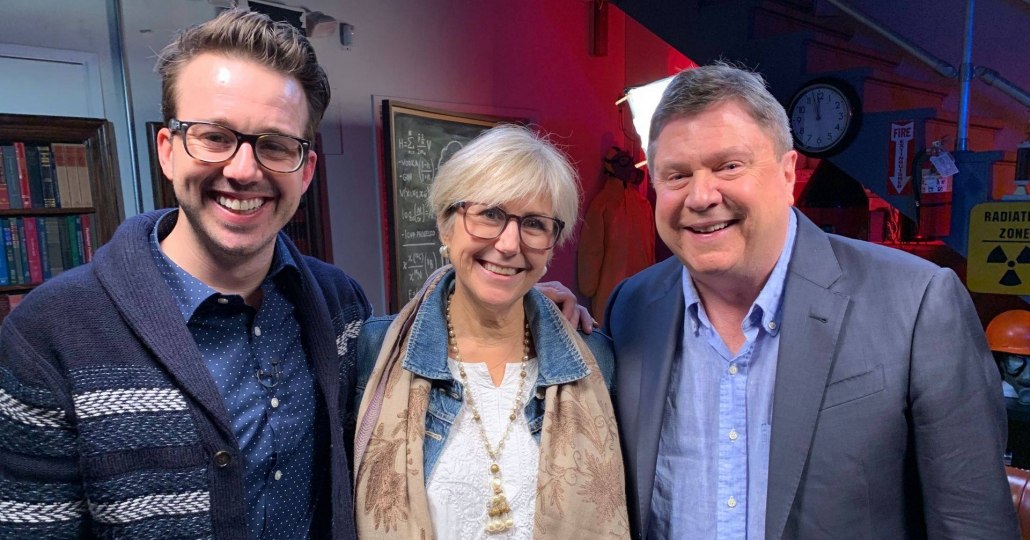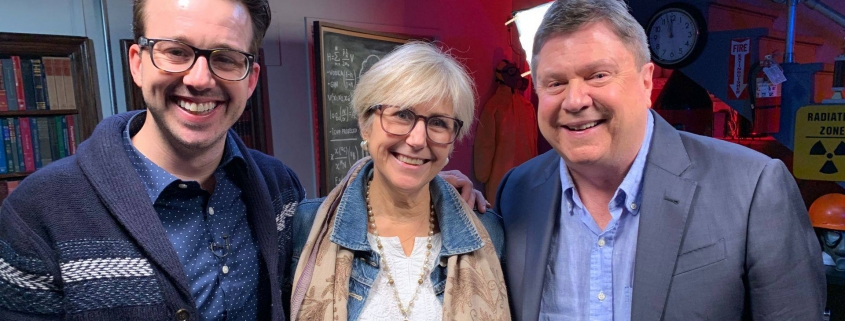Comedy YouTube series discusses dangers of nuclear power

To combat the general public’s ignorance on nuclear power, YouTube series “Getting Bombed” aims to explain the mystery behind the technology that threatens mankind in the 21st century — all while enjoying a few drinks.
Actor, comedian and filmmaker Chris Reinacher sits down in a makeshift doomsday bunker with different nuclear experts for each 10-minute episode posted weekly on his YouTube channel. As the episode progresses, Reinacher and his guest are joined by a silent man in a hazmat suit named Jeff, who serves alcoholic drinks periodically throughout the episode.
“Getting Bombed,” which premiered Feb. 8, is jointly produced by the Annenberg Norman Lear Center’s Hollywood, Health & Society program and the digital content studio Ovrture of 44 Blue Productions.
The Norman Lear Center covers multiple social justice topics, such as HIV and climate change, that threaten the public’s well-being. Roberta Cruger, a program specialist for the Climate Change Initiative in the Hollywood, Health, & Society program, said she believes “Getting Bombed” is in line with the goals of the Norman Lear Center.
“If we can have an impact on the viewers to change their minds, change their behavior, to take action, that would be really beneficial,” Cruger said.
David Hale, a producer at 44 Blue Production, said the series hopes to tackle the daunting subject of nuclear proliferation through a humorous, light-hearted lens.
“Being unguarded and unfiltered allows for humor, and it’s a subject that I think needs more raw talk,” Hale said. “And it really begs to be more unguarded and more unfiltered. And that’s where the alcohol comes in.”
Kate Folb, director of Hollywood, Health and Society, said the idea behind the series came after attending dinner with nuclear experts who, after a few drinks, started discussing nuclear power topics, such as nuclear policies and new designs of nuclear missiles.
“They’re progressively getting drunker as they’re talking,” Folb said. “And I’m just sitting there at dinner watching this. And my colleague and I looked at each other and said, ‘Oh my God, this is so interesting and it’s hilarious’ … This has to be a show.”
Folb described that the goal of the series is to generate awareness in the general population about the many complications of nuclear power, hopefully leading to an eventual change in public policies.
“We need to be educated about these things, and we do need to be able to know what’s going on and to share our voice if we feel a certain way about how nuclear weapons are being used or threatened to be used in this country, or even where they’re stored,” Folb said.
Awareness about nuclear power is relevant in today’s society, Folb said. The Doomsday Clock, created by the Bulletin of the Atomic Scientists, is a machine which indicates the probability of man-made catastrophe through a countdown on a clock. Currently at 100 seconds to midnight, it is the closest the clock has been to midnight, or doomsday, since the clock’s creation in 1947.
Even though the threat of nuclear war is depressing, Hale said it is a topic that needs to be at the forefront of people’s minds. Having lived through the Cold War, Hale said he believes young people today do not have the same cognizance of the possibility of nuclear war that he had growing up.
“There’s a generation of people who are going to have to live through a new era of nuclear tensions, and we don’t really know how seriously to take those tensions,” Hale said. “I think it’s kind of interesting for audiences to look back at these earlier stories so that they can start to get a sense of the mindset of what it was for the Cold War.”
The absence of prolonged discussion on foreign policy in the 2020 Democratic debates also affects nuclear policy. The relationship the U.S. has with other countries with nuclear technology, such as Russia and Iran, impact U.S. elections and the safety of American citizens, according to Hale.
“I do think that foreign policy is a huge metric by which to measure up a candidate and the idea that nuclear weapons and nuclear strategy are becoming so much more relevant,” Hale said. “We can frame any conversation against what it means for the 2020 election, but I think this is a very important conversation to frame against it.”
Reinacher said nuclear power and its potential devastation is not a light topic, and the series does not aim to treat it as such. The host said he hopes the alcohol serves as a helpful way to connect with the audience through humor.
“I like approaching serious things in a funny or cavalier way … because I think it kind of brings down this mysticism, and it brings down the fear of talking about something, and it makes it fun in a way,” Reinacher said.
Additionally, Reinacher acknowledges that nuclear power can be difficult to understand in its entirety for viewers of the series who are not experts in the nuclear field. Through “Getting Bombed,” Reinacher said he wants to reach the average person, even if they do not know much about the subject of nuclear war.
“I know nothing, you’re with me,” Reinacher said. “Let’s ask a bunch of questions, even if they’re stupid.”

